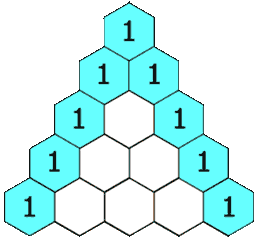An Interest In:
Web News this Week
- April 19, 2024
- April 18, 2024
- April 17, 2024
- April 16, 2024
- April 15, 2024
- April 14, 2024
- April 13, 2024
Solution: Pascal's Triangle
This is part of a series of Leetcode solution explanations (index). If you liked this solution or found it useful, please like this post and/or upvote my solution post on Leetcode's forums.
Leetcode Problem #118 (Easy): Pascal's Triangle
Description:
(Jump to: Solution Idea || Code: JavaScript | Python | Java | C++)
Given an integer
numRows, return the firstnumRowsof Pascal's triangle.In Pascal's triangle, each number is the sum of the two numbers directly above it as shown:
Examples:
Example 1: Input: numRows = 5 Output: [[1],[1,1],[1,2,1],[1,3,3,1],[1,4,6,4,1]]
Example 2: Input: numRows = 1 Output: [[1]]
Constraints:
1 <= numRows <= 30
Idea:
(Jump to: Problem Description || Code: JavaScript | Python | Java | C++)
For this problem, we can do pretty much just as the instructions tell us. We'll iterate through the building of Pascal's triangle (ans), row by row. When we create each new row, we should initially fill it with 1s so that we don't have to worry about the logic of filling the edge cells that only have one number above.
Then we can start on j = 1 for each row and repeat the process of summing up the value of the current cell until we reach the midpoint (mid). Since the triangle is symmetrical, we can actually fill both halves of the row at once, while we work inward.
Once we reach the end of the last row, we can return ans.
- Time Complexity: O(N) where N is the numRowsth triangular number
- Space Complexity: O(1)
Javascript Code:
(Jump to: Problem Description || Solution Idea)
var generate = function(numRows) { let ans = new Array(numRows) for (let i = 0; i < numRows; i++) { let row = new Uint32Array(i+1).fill(1), mid = i >> 1 for (let j = 1; j <= mid; j++) { let val = ans[i-1][j-1] + ans[i-1][j] row[j] = val, row[row.length-j-1] = val } ans[i] = row } return ans};Python Code:
(Jump to: Problem Description || Solution Idea)
class Solution: def generate(self, numRows: int) -> List[List[int]]: ans = [None] * numRows for i in range(numRows): row, mid = [1] * (i + 1), (i >> 1) + 1 for j in range(1, mid): val = ans[i-1][j-1] + ans[i-1][j] row[j], row[len(row)-j-1] = val, val ans[i] = row return ansJava Code:
(Jump to: Problem Description || Solution Idea)
class Solution { public List<List<Integer>> generate(int numRows) { List<List<Integer>> ans = new ArrayList<List<Integer>>(numRows); for (int i = 0; i < numRows; i++) { List<Integer> row = new ArrayList<>(i+1); while (row.size() <= i) row.add(1); int mid = i >> 1; for (int j = 1; j <= mid; j++) { int val = ans.get(i-1).get(j-1) + ans.get(i-1).get(j); row.set(j, val); row.set(row.size()-j-1, val); } ans.add(row); } return ans; }}C++ Code:
(Jump to: Problem Description || Solution Idea)
class Solution {public: vector<vector<int>> generate(int numRows) { vector<vector<int>> ans(numRows); for (int i = 0; i < numRows; i++) { vector<int> row(i+1, 1); int mid = i >> 1; for (int j = 1; j <= mid; j++) { int val = ans[i-1][j-1] + ans[i-1][j]; row[j] = val; row[row.size()-j-1] = val; } ans[i] = row; } return ans; }};Original Link: https://dev.to/seanpgallivan/solution-pascal-s-triangle-154d
Dev To
 An online community for sharing and discovering great ideas, having debates, and making friends
An online community for sharing and discovering great ideas, having debates, and making friendsMore About this Source Visit Dev To


